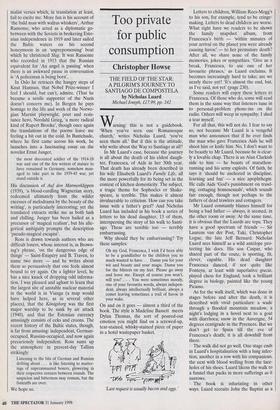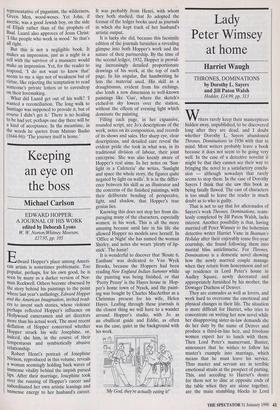Too private for public consumption
Christopher Howse
THE FIELD OF THE STAR: A PILGRIM'S JOURNEY TO SANTIAGO DE COMPOSTELA by Nicholas Luard Michael Joseph, £1 7.99, pp. 242 Warning: this is not a guidebook. 'When you've seen one Romanesque church,' writes Nicholas Luard, 'you've seen them all.' But if this is the attitude, why write about the Way to Santiago at all?
In Mr Luard's case, because the journey is all about the death of his eldest daugh- ter, Francesca, of Aids in her 30th year. That death has already been described in his wife Elisabeth Luard's Family Life, all the more powerfully for its being set in the context of kitchen domesticity. The subject, a tragic theme for Sophocles or Shake- speare, is terrible. This makes it almost invulnerable to criticism. How can you take issue with a father's grief? And Nicholas Luard has included in his book a series of letters to his dead daughter, 13 of them, interspersing the story of his walk to Santi- ago. These are terrible too — terribly embarrassing.
Why should they be embarrassing? Try these samples:
Oh my God, Francesca, I wish I'd been able to be a grandfather to the children you so much wanted to have... Damn you for your wit and beauty and your magic. Damn you for the blisters on my feet. Please go away and leave me, Except of course you won't, will you? . . You were sometimes moody, one of your favourite words, always indepen- dent, always intellectually brilliant, always a comet leaving sometimes a trail of havoc in your wake.
On and on it goes — almost a third of the book. The style is Madeline Bassett meets Dylan Thomas, the sort of poured-out emotion you might find on a screwed-up, tear-stained, whisky-stained piece of paper in a hotel wastepaper basket.
'Last request is usually bacon and eggs.' Letters to children, William Rees-Mogg's to his son, for example, tend to be cringe- making. Letters to dead children are worse. What right have we readers to be shown the family snapshot album, from Francesca's birth — 'within minutes of your arrival on the planet you were already causing havoc' — to her premature death? After all, we share none of the family memories, jokes or sympathies. 'Give us a break, Francesca, to use one of her favourite phrases,' as Luard exclaims. It becomes increasingly hard to take; are we nearly there yet? 'It's almost the end, but, as I've said, not yet' (page 230).
Some readers will enjoy these letters to Francesca. Of those who do, some will read them in the same way that listeners tune in to personal-problem phone-ins on the radio. Others will weep in sympathy; I shed a tear myself.
For all that, this will not do. I fear to say so, not because Mr Luard is a vengeful man who announces that if he ever finds the man who gave Francesca Aids he will shoot him or knife him. No, I don't want to be beastly to Mr Luard, because he is clear- ly a lovable chap. There is an Alan Clarkish side to him — he boasts of marathon- running and his army exploits. Of faith, he says it 'should be anchored in discipline, learning and fun' — a nice apophthegm. He calls Aids 'God's punishment on trawl- ing, cottaging homosexuals', which sounds fair enough, though not perhaps to the fathers of dead trawlers and cottagers.
Mr Luard constantly blames himself for being a bad father — always, it seemed, in the other room or away. At the same time, it is obvious that the Luards are tops. They have a good spectrum of friends — Sir Laurens van der Post, Taki, Christopher Logue, the late Jeff Bernard. Nicholas Luard sees himself as a wild antelope pro- tecting his does. His son Caspar, who shared part of the route, is sporting, fit, clever, capable. His dead daughter Francesca danced, if not quite like Fonteyn, at least with superlative gracia, played chess for England, took a brilliant degree in biology, painted like the young Picasso.
As for the walk itself, which was done in stages before and after the death, it is described with vivid particulars: a wade through a flooded mountain meadow, a night's lodging in a hovel next to a goat with diarrhoea; snow in the Auvergne, 54 degrees centigrade in the Pyrenees. But we don't get to Spain till the eve of Francesca's death; it is all downhill from there.
The walk did not go well. One stage ends in Luard's hospitalisation with a lung infec- tion, another in a row with his companions, the next with blood welling from the lace- holes of his shoes. Luard likens the walk to a funnel that packs in more sufferings as it narrows.
The book is infuriating in other ways. Luard recruits John the Baptist as a representative of paganism, the wilderness, Green Men, wood-woses. Yet John, if ascetic, was a good Jewish boy, on the side of Elijah rather than of the prophets of Baal. Luard also approves of Jesus Christ: 'I like people who work in wood.' So that's all right.
But this is not a negligible book. It makes an impression, just as a night in a cell with the survivor of a massacre would make an impression. Yet, for the reader to respond, 'I do not want to know that' seems to me a sign not of weakness but of virtue, like rejecting the temptation to read someone's private letters or to eavesdrop on their lovernaldng.
What did Luard get out of his walk? 'I wanted a reconciliation. The long walk to Santiago was supposed to provide it, but of course I didn't get it.' There is no healing to be had yet; perhaps one day there will be a kind of acceptance. In the meantime, in the words he quotes from Matsuo Basho (1644-94): 'The journey itself is home.'



































































 Previous page
Previous page